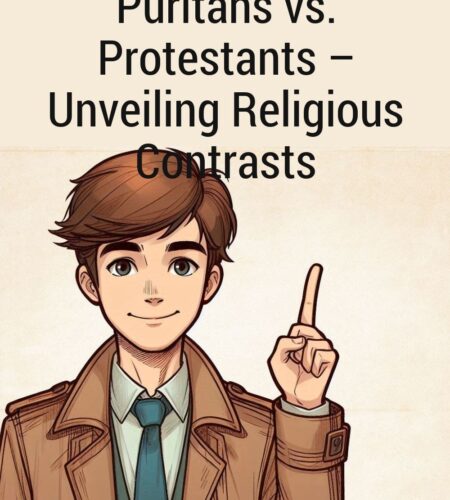Religion has always played a pivotal role in shaping societies, and two significant movements in Christian history, Puritanism and Protestantism, have left enduring marks on the religious landscape. In this exploration, we will delve into 15 key distinctions that set Puritans and Protestants apart. Join us as we journey through the theological, social, and historical disparities that define these two influential Christian factions.
Difference 1: Origins
Puritans: A Subgroup of Protestants
Puritans were a subgroup within the broader Protestant movement. They emerged in the 16th and 17th centuries in England and later played a significant role in the colonization of North America.
Protestants: The Wider Reformation Movement
Protestantism, as a whole, is a Christian movement that traces its roots to the 16th-century Reformation, which sought to reform the Roman Catholic Church. It encompasses various denominations and theological traditions.
Nuance: Puritans are a subset of the larger Protestant tradition.
Difference 2: Theology
Puritans: Emphasis on Calvinist Theology
Puritans were deeply influenced by Calvinist theology, which stressed the concept of predestination, where God has already determined who will be saved and who will be damned.
Protestants: Diverse Theological Traditions
Protestantism encompasses a wide range of theological perspectives, including Lutheranism, Reformed theology, and Anglicanism, among others. Not all Protestants adhere to Calvinist beliefs.
Nuance: Puritans follow a specific branch of Protestant theology.
Difference 3: Worship and Liturgy
Puritans: Simplicity and Plainness
Puritan worship services were characterized by simplicity and a focus on Scripture. They eschewed elaborate rituals and emphasized the primacy of the Bible.
Protestants: Diverse Worship Practices
Protestants have a range of worship practices, from high church Anglican liturgy to more contemporary and informal services in evangelical denominations.
Nuance: Puritan worship is marked by a stark simplicity, while Protestants exhibit a broader range of worship styles.
Difference 4: Ecclesiastical Structure
Puritans: Congregational Polity
Puritans favored a congregational form of church government, where each local congregation had autonomy in decision-making and leadership.
Protestants: Varied Polity
Protestants employ various forms of church government, including episcopal (hierarchical), presbyterian (elders governing), and congregational polity, depending on the denomination.
Nuance: Puritans predominantly adopted a congregational polity, while Protestants vary in their ecclesiastical structures.
Difference 5: Sacraments
Puritans: Limited Sacraments
Puritans typically recognized only two sacraments: baptism and the Lord’s Supper (communion). They viewed these as essential but did not incorporate other rituals.
Protestants: Differing Sacramental Views
Protestants have a spectrum of views regarding the number and significance of sacraments. Some, like Lutherans, recognize more sacraments, while others, like Baptists, may have a minimal sacramental emphasis.
Nuance: Puritans adhere to a limited sacramental focus, while Protestants exhibit varying sacramental traditions.
Difference 6: Attitude Towards Anglicanism
Puritans: Critique and Separation
Puritans were critical of the Anglican Church (Church of England) for what they perceived as its remnants of Catholic rituals and practices. Many Puritans sought to separate from it.
Protestants: Diverse Relationships with Anglicanism
Protestant denominations have varying relationships with Anglicanism. Some, like the Episcopal Church, are part of the Anglican tradition, while others, like Methodists, have roots in Anglicanism but distinct theology.
Nuance: Puritans actively critiqued and sought separation from Anglicanism, while Protestants exhibit a range of relationships with it.
Difference 7: View on Predestination
Puritans: Embracing Predestination
Puritans strongly emphasized the Calvinist doctrine of predestination, believing in the absolute sovereignty of God in salvation.
Protestants: Diverse Views on Predestination
Protestants encompass a range of perspectives on predestination, with some denominations adhering to Calvinist views and others embracing different interpretations.
Nuance: Puritans staunchly adhere to predestination, while Protestants hold diverse views.
Difference 8: Persecution and Migration
Puritans: Fleeing Religious Persecution
Puritans faced persecution in England and sought religious freedom by migrating to the New World, where they played a significant role in the founding of the Plymouth Colony.
Protestants: Dispersed and Varied Experiences
Protestants have experienced persecution in different times and places, resulting in diverse migration patterns and contributions to various societies.
Nuance: Puritans migrated to escape religious persecution, while Protestants have diverse experiences of persecution and migration.
Difference 9: Influence on American Colonies
Puritans: Founding New England
Puritans had a profound impact on the early American colonies, particularly in New England, where they established communities based on their religious values.
Protestants: Varied Influence
Protestants, as a broader category, influenced the founding and development of various American colonies, each with its own distinct religious and cultural characteristics.
Nuance: Puritans played a significant role in shaping New England, while Protestants had a diverse impact across American colonies.
Difference 10: Tolerance of Other Religions
Puritans: Limited Religious Tolerance
Puritans, despite seeking religious freedom, often exhibited limited tolerance for other religious beliefs and persecuted dissenters within their own communities.
Protestants: Diverse Approaches to Tolerance
Protestants have shown a range of attitudes towards religious tolerance, with some advocating for it and others opposing it, depending on the denomination and historical context.
Nuance: Puritans had limited religious tolerance, while Protestants’ attitudes towards tolerance vary.
Difference 11: Role of Women
Puritans: Traditional Gender Roles
Puritans adhered to traditional gender roles, with women primarily responsible for household and child-rearing duties.
Protestants: Diverse Gender Roles
Protestant denominations exhibit a range of views on gender roles, with some advocating for more egalitarian roles for women in the church and society.
Nuance: Puritans adhered to traditional gender roles, while Protestants have diverse views on this topic.
Difference 12: Cultural and Artistic Impact
Puritans: Opposition to Extravagance
Puritans were known for their opposition to cultural and artistic extravagance, believing in simplicity in all aspects of life.
Protestants: Varied Cultural Engagement
Protestants have engaged with culture and the arts in diverse ways, with some denominations encouraging artistic expression while others have been more reserved.
Nuance: Puritans were opposed to cultural extravagance, while Protestants have exhibited a range of attitudes toward cultural engagement and artistic expression.
Difference 13: Revival Movements
Puritans: Focus on Personal Piety
Puritans emphasized personal piety and devotion, often seeking spiritual renewal within themselves and their communities.
Protestants: Diverse Revival Movements
Protestantism has been the catalyst for various revival movements, including the Great Awakening, which swept across America in the 18th century, emphasizing emotional and experiential aspects of faith.
Nuance: Puritans focused on personal piety, while Protestants have given rise to a range of revival movements.
Difference 14: Political Involvement
Puritans: Influence on Early American Politics
Puritans had a significant influence on early American political thought, particularly in New England, where their religious principles informed governance.
Protestants: Varied Political Engagement
Protestants have engaged with politics in diverse ways, with denominations exhibiting a range of views on the intersection of faith and government.
Nuance: Puritans played a pivotal role in shaping early American politics, while Protestants vary in their political engagement.
Difference 15: Contemporary Presence
Puritans: Limited Contemporary Presence
Puritanism as a distinct movement has largely faded, with its influence primarily seen in historical and academic contexts.
Protestants: Global and Diverse Presence
Protestantism remains a global and diverse movement, with a wide array of denominations and adherents across the world.
Nuance: Puritanism has limited contemporary presence, while Protestantism maintains a global and diverse presence.
Conclusion
In the intricate tapestry of Christian history, Puritans and Protestants stand as unique threads, each weaving its own narrative of faith, theology, and societal impact. While Puritans emerged as a subgroup within the broader Protestant tradition, their distinctive characteristics and beliefs set them apart, particularly in their emphasis on Calvinist theology and the pursuit of religious freedom. Protestants, on the other hand, form a diverse and multifaceted category, encompassing a wide spectrum of beliefs and practices, from high liturgy to contemporary worship.
As we unravel the 15 differences that distinguish Puritans from Protestants, we witness the rich complexity of Christianity’s evolution and its far-reaching effects on society, culture, and politics. Whether rooted in the past or thriving in the present, these two Christian traditions continue to leave indelible marks on the world, each contributing to the ongoing story of faith and belief.
Subscribe to our email newsletter to get the latest posts delivered right to your email.





Comments